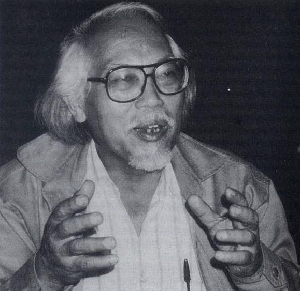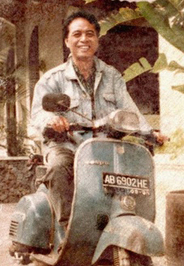Related Research Articles

Goenawan Mohamad is an Indonesian poet, essayist, playwright and editor. He is the founder and editor of the Indonesian magazine Tempo. Mohamad is a vocal critic of the Indonesian government, and his magazine was periodically shut down due to its criticisms.

Yusuf Bilyarta Mangunwijaya, was an Indonesian architect, writer, and Catholic religious leader. He was popularly known as Romo Mangun.
Ahmadun Yosi Herfanda, is an Indonesian journalist and poet. His name is also written as Ahmadun YH, Ahmadun Y. Herfanda, Ahmadun Herfanda, or AYH (ayeha). Ahmadun's poetry focuses on social and religious themes and is informed by Sufism. He is a reporter and arts editor at the daily newspaper Republika. Now, he is known as a famous Indonesian poet and writer.

Umar Kayam was an Indonesian sociologist and writer.

Afrizal Malna, is an Indonesian activist, writer of prose, poetry, and theatrical texts.

Ajip Rosidi was an Indonesian poet and short story writer. As of 1983 he had published 326 works in 22 different magazines.

Christophorus Apolinaris Eka Budianta Martoredjo is an Indonesian poet. He is also known as C. A. Eka Budianta and more commonly known as Eka Budianta.

Linus Suryadi Agustinus, commonly known Linus Suryadi AG or Linus Suryadi AGN was born in Sleman, Indonesia on 3 March 1951 and died in Yogyakarta on 30 July 1999 at the age of 48.

Toeti Heraty was an Indonesian poet. She has been singled out as the "only woman amongst the leading contemporary Indonesian poets".
Ida Ayu Oka Rusmini, known as Oka Rusmini, is an Indonesian poet and novelist. She is a recipient of the S.E.A. Write Award.

Arifin Chairin Noer was an Indonesian poet, theater director and film producer.

Tahi Bonar Simatupang was a soldier who served in the Indonesian National Revolution and went on to become chief of staff of the Indonesian Armed Forces.
Harry Aveling is an Australian scholar, translator and teacher. He specialises in Indonesian and Malaysian literature, and Translation Studies. He received the degrees of Doctor of Philosophy in Malay Studies from the National University of Singapore and Doctor of Creative Arts (DCA) from the University of Technology, Sydney. Besides his academic writing, he has translated extensively from Indonesian and Malay, from Vietnamese Francophone literature, and also co-translated from Hindi. He has been awarded the Anugerah Pengembangan Sastra for his translation work. Aveling has two sons, a daughter and five granddaughters.

Sariamin Ismail was the first female Indonesian novelist to be published in the Dutch East Indies. A teacher by trade, by the 1930s she had begun writing in newspapers; she published her first novel, Kalau Tak Untung, in 1933. She published two novels and several poetry anthologies afterwards, while continuing to teach and – between 1947 and 1949 – serving as a member of the regional representative body in Riau. Her literary works often dealt with star-crossed lovers and the role of fate, while her editorials were staunchly anti-polygamy. She was one of only a handful of Indonesian women authors to be published at all during the colonial period, alongside Fatimah Hasan Delais, Saadah Alim, Soewarsih Djojopoespito and a few others.

Boenga Roos dari Tjikembang is a 1927 vernacular Malay-language novel written by Kwee Tek Hoay. The seventeen-chapter book follows a plantation manager, Aij Tjeng, who must leave his beloved njai (concubine) Marsiti so that he can be married. Eighteen years later, after Aij Tjeng's daughter Lily dies, her fiancé Bian Koen discovers that Marsiti had a daughter with Aij Tjeng, Roosminah, who greatly resembles Lily. In the end Bian Koen and Roosminah are married.

Korrie Layun Rampan was an Indonesian novelist, short story writer, poet, literary critic, journalist, and politician.
Triyanto Triwikromo is an Indonesian writer born in Salatiga, Central Java.
Sori Siregar is an Indonesian writer whose full name is Sutan Sirovi Sori Siregar. After graduating his high school in Medan (1959), he continued his higher education in Medan and started writing in 1960. Since then he wrote short stories for 18 years, and wrote his first novel in 1980. He is a younger brother of Ridwan Siregar.

Dimas Arika Mihardja was an Indonesian poet and scholar, essayist. He wrote under a pseudonym, the real name is Sudaryono. Among friends he was called as Dam.
References
- ↑ "Biodata Penulis-Hanna Rambe" (in Indonesian). Yayasan Obor Indonesia. Archived from the original on 25 April 2012. Retrieved 16 November 2011.
- 1 2 On the Record: Films Transcripts and Biographical Information – Indonesian Literary Figures Volume 4. Jakarta, Indonesia: Lontar. 2004.
- ↑ Miller, Jane (2000). Who's Who in Contemporary Women's Writing. New York: Routledge. pp. 267–268. ISBN 978-0-415-15980-7.
- ↑ Rambe, Hanna (2003). Mirah dari Banda : sebuah novel (in Indonesian). Magelang: IndonesiaTera. ISBN 978-979-9375-48-3.
- ↑ "Biography of Rambe, Hanna, 1940- | Southeast Asia Digital Library". sea.lib.niu.edu. Retrieved 12 July 2022.
- ↑ Korrie Layun Rampan (25 February 1996). "Wanita Novelis Indonesia" [Indonesian Female Novelists]. Kompas (in Indonesian). Jakarta. Archived from the original on 2 April 2015. Retrieved 16 November 2011.
- ↑ Rambe, Hanna (2010). Mirah of Banda. Jakarta, Indonesia: Lontar. ISBN 978-979-8083-78-5.